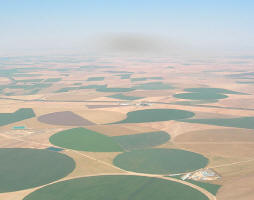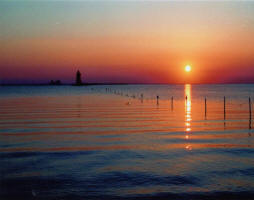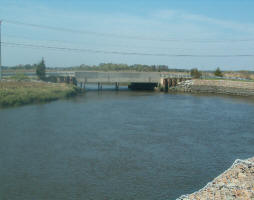 Urgent need to focus on wetlands as natural solutions to global water crisis
Urgent need to focus on wetlands as natural solutions to global water crisis
A report on the Economics of Ecosystems and Biodiversity for Water and Wetlands urges a major shift in our attitudes to wetlands, to recognise their value in delivering water, raw materials and food, essential for life, and crucial for maintaining people’s livelihoods and the sustainability of the world’s economies.
The report launched 1 February presents insights on critical water-related ecosystem services in order to encourage additional policy momentum, business commitment, and investment in the conservation, restoration, and wise use of wetlands.
It shows how recognizing, demonstrating, and capturing the values of ecosystem services related to water and wetlands can lead to better informed, more efficient, and fairer decision-making.
For example, improved water management practices allowed the restoration of Lake Ichkeul in Tunisia, resulting in the doubling of the number of tourists since 2005. The promotion of the lake as a tourist destination helped raise awareness of the value of the lake ecosystems and the importance of the wise use of wetlands. It also generated new sources of income for the Park management and conservation and allowed establishment of basic training and credit schemes to increase the involvement of local communities in tourism activities.
“It is poor people who suffer the most when biodiversity is lost, because their survival depends on the wealth of nature. When we destroy wetlands, we disrupt nature's water cycle and its ability to provide water for households and farms, so inadvertently we add to the suffering of the poor. This report reinforces the message that restoration and protection of wetlands is vital to address today’s most pressing challenges of water and food security, climate change, and poverty. 'TEEB Water and Wetlands' calls on development policy-makers to recognize these ecosystem values and put in place policy responses that promote the conservation and restoration of wetlands" says TEEB Study Leader and UNEP Goodwill Ambassador Pavan Sukhdev, currently Chair of the TEEB Advisory Board.
The TEEB report reinforces this year’s World Wetlands Day message that, despite the evidence that wetlands provide huge benefits to people such as clean drinking water, facilitating irrigation for agriculture, enabling flood regulation, as well as supporting biodiversity and industries such as fisheries and tourism, their value is still underestimated and wetlands continue to be degraded or destroyed at an alarming pace. An estimated 50% of wetlands were lost during the 20th century due to factors such as intensive agricultural production, water extraction for domestic and industrial use, urbanization, infrastructure and industrial development and pollution.
“Everyone in the world depends on water for our life, livelihoods and business, and coastal and inland wetlands are the natural infrastructure that manage and provide our water for us” says Nick Davidson, Deputy Secretary General of the Ramsar Convention. “This report confirms just how hugely valuable our remaining wetlands are to all of us, yet we continue to damage and destroy them at our increasing peril.”
“The TEEB report makes it clear that investing in the natural infrastructure of wetlands is a vital part of the future development agenda for water. Solutions for water security work best when we combine sustainable human ingenuity with the services provided by healthy ecosystems,” says Mark Smith, Director IUCN Global Water Programme. The report provides specific practical recommendations for actors at all levels such as policy and decision-makers in the public and private sectors, on how to integrate the values of wetlands in decision-making.
“The wise use and restoration of wetlands will support the fundamental objectives of water security, food security, help address climate change, save money for public and private budgets, and support livelihoods” says Patrick ten Brink, Senior Fellow, Head of Brussels office & Environmental Economics Programme (IEEP).
To cite another example, in the Philippines, the Tubbataha Reefs Natural Marine Park, a Ramsar and World Heritage Site, was created in 1988 and established no-take zones for fishing, as destructive fishing was increasingly threatening the function of the reef as a nursery ground for the Sulu Sea. Despite the ban, fishers were not convinced of the benefits of a no-take zone and claimed their rights to extract resources in the park. In 1999 a workshop was held involving all interest groups – preservationists as well as fishers. They agreed that tourists pay a conservation fee, which is used to manage the protected area, compensate fishermen and fund livelihood initiatives in communities in the region. As a result, the no-take zone has been respected and fish biomass has increased both within the park and outside the park boundaries.
An increased appreciation of the societal values of water-related ecosystem services from nature and the wider range of wetland ecosystem services will be essential to catalyse appropriate policy and business responses.
“Degradation and loss of wetlands has been due in a large part to limited awareness of their value and ineffective policy and management. It is clear we have already suffered significant socio-economic losses from this, in addition to the loss of biodiversity associated with these high value systems. The good news is that the report convincingly shows the value of sustaining and in particular restoring these ecosystems” says Braulio F. de Souza Dias, Executive Secretary of the Convention on Biological Diversity.
World Wetlands Day (WWD) is celebrated worldwide every year to deliver the message that healthy wetlands, and the ecosystem services they provide, are vital for life and its diversity. For WWD 2013, and as a contribution to the UN International Year for Water Cooperation, the Ramsar Convention Secretariat focuses this year’s campaign on wetlands and water management to show the interdependence between water and wetlands and the key role wetlands play. Its key objective is to highlight the importance of conserving and enhancing the ecosystem services provided by water and wetlands.
For more information or to set up interviews, please contact:
TEEB Communications: Sharon Oseku-Frainier on +41 22 917 8255, Email: sharon.oseku-frainier@unep.org
Oana Barsin, Ramsar Secretariat Communications Officer on +41 22 999 0331, Email: barsin@ramsar.org
Notes to Editors TEEB Water and Wetlands and its executive summary can be downloaded from www.teebweb.org.
The report was initiated by the Ramsar Convention Secretariat, with financial support from the Norwegian, Swiss and Finnish Governments and the International Union for Conservation of Nature (IUCN). It was produced by the Institute for European Environmental Policy (IEEP) and the Ramsar Convention Secretariat, in collaboration with The United Nations Environment Programme (UNEP) TEEB Office, the Secretariat of the Convention on Biological Diversity, Wetlands International, the Helmholtz Centre for Environmental Research (UFZ), and the International Union for Conservation of Nature (IUCN). It benefited from contributions of case studies from around the globe, an extensive review process and discussion at the Rio+20 Conference, the Ramsar COP 11 in Bucharest, and the CBD COP11 in Hyderabad.
World Wetlands Day activities in Geneva and surroundings:
- Thursday 31 January 2013, La Rade de Genève (contact DIME at +41 (0)22 546 76 00)
- Saturday 2 February, Grande Cariçaie, http://www.grande-caricaie.ch/spip/spip.php?rubrique322
- Sunday 3 February, events organised by Pro Natura Geneva, 10.00 – 16.00 at the Réserve de la Pointe-à-la-Bise and 13.00- 18.00 in Parc Mont-Repos (Perle du Lac) / pavillon Plantamour (La Libellule)
- LPO activities in France: http://www.zones-humides.eaufrance.fr/agir/ramsar-et-la-journee-mondiale-des-zones-humides/espace-visiteurs-programme-2013
WWD materials available at www.ramsar.org/WWD2013/
| Contact information |
TEEB Communications: Sharon Oseku-Frainier / Oana Barsin, Ramsar Secretariat Communications Officer
(email: sharon.oseku-frainier@unep.org ; barsin@ramsar.org) Phone: +41 22 917 8255 / +41 22 999 0331 |
|---|---|
| News type | Inbrief |
| File link |
http://www.iucn.org/about/work/programmes/water/?11840/Urgent-need-to-focus-on-wetlands-as-natural-solutions-to-global-water-crisis |
| Source of information | IUCN / RAMSAR |
| Keyword(s) | wetlands, water crisis |
| Subject(s) | FINANCE-ECONOMY , HYDRAULICS - HYDROLOGY , METHTODOLOGY - STATISTICS - DECISION AID , NATURAL MEDIUM , PREVENTION AND NUISANCES POLLUTION , RIGHT , RISKS AND CLIMATOLOGY , WATER QUALITY |
| Relation | http://www.teebweb.org |
| Geographical coverage | n/a |
| News date | 11/02/2013 |
| Working language(s) | ENGLISH |
 you are not logged in
you are not logged in





